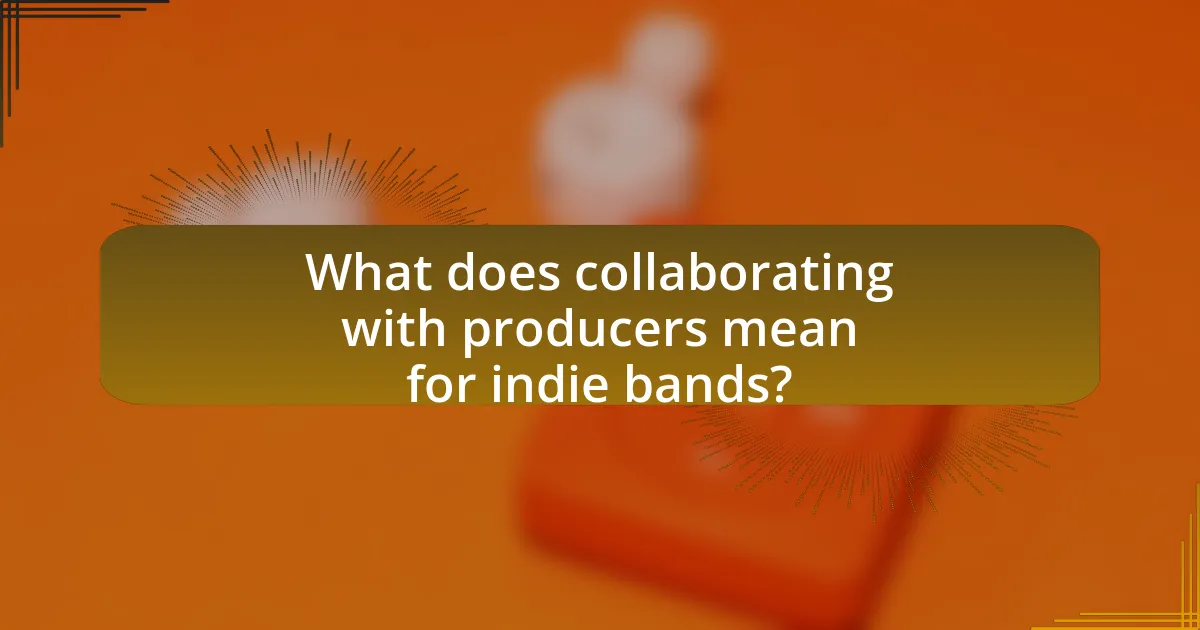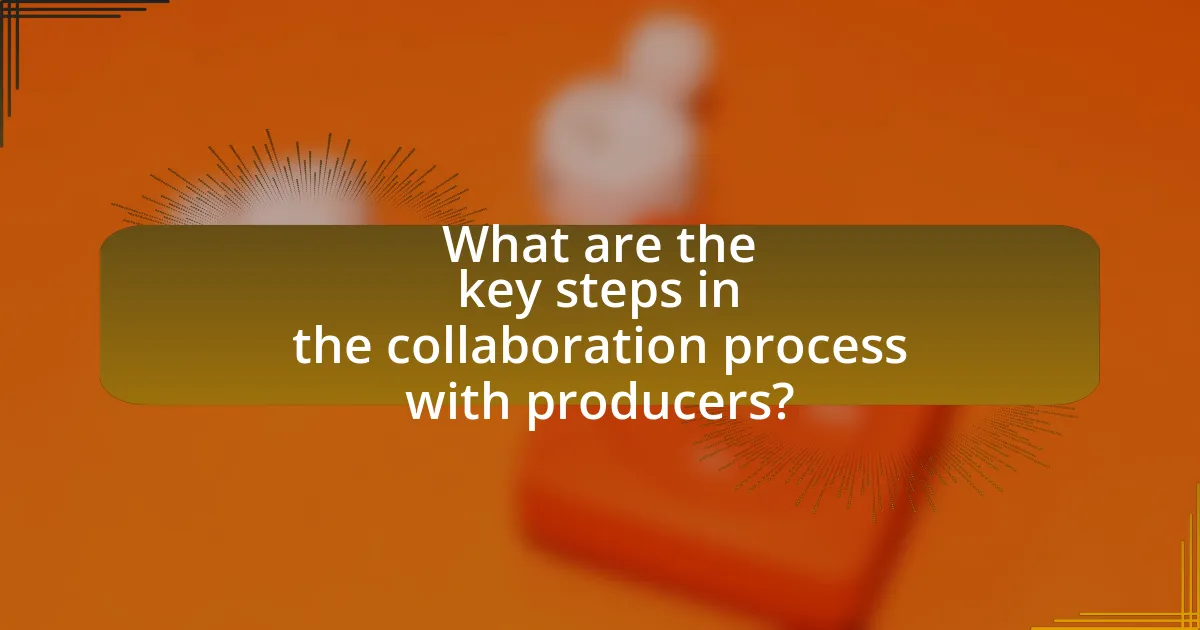Collaborating with producers is a crucial aspect for indie bands seeking to enhance their music quality and marketability. This article explores the benefits of such collaborations, including access to professional expertise, improved sound quality, and increased audience reach. It outlines the specific roles producers play in the music creation process, the factors indie bands should consider when selecting a producer, and the key steps for a successful collaboration. Additionally, it addresses common challenges faced during the collaboration and offers practical tips for maximizing studio time and maintaining effective communication throughout the project.

What does collaborating with producers mean for indie bands?
Collaborating with producers means that indie bands gain access to professional expertise, resources, and industry connections that can enhance their music quality and marketability. Producers bring technical skills in sound engineering, arrangement, and songwriting, which can elevate the overall production value of an indie band’s recordings. For instance, a study by the Berklee College of Music highlights that artists who work with experienced producers often see a significant increase in their streaming numbers and audience reach, demonstrating the tangible benefits of such collaborations.
How can indie bands benefit from working with producers?
Indie bands can benefit from working with producers by gaining access to professional expertise that enhances their sound quality and overall production value. Producers bring technical skills, industry knowledge, and creative input that can help refine a band’s musical vision. For instance, a study by the Berklee College of Music found that artists who collaborate with experienced producers often achieve higher chart placements and increased streaming numbers, demonstrating the tangible impact of professional guidance on an indie band’s success.
What specific roles do producers play in the music creation process?
Producers play crucial roles in the music creation process by overseeing the recording, arrangement, and production of music tracks. They collaborate with artists to shape the sound and direction of a project, ensuring that the final product aligns with the artist’s vision while also appealing to the target audience. Producers often provide technical expertise, guiding the recording process, selecting appropriate equipment, and managing studio sessions to optimize sound quality. Additionally, they may contribute creatively by suggesting song structures, instrumentation, and vocal arrangements, which can significantly enhance the overall composition. Their involvement can lead to a more polished and commercially viable product, as evidenced by the success of numerous albums that have benefited from skilled production.
How does collaboration with producers enhance the sound of indie bands?
Collaboration with producers enhances the sound of indie bands by providing professional expertise in sound engineering and arrangement. Producers bring technical skills and industry experience that help refine the band’s musical ideas, resulting in a polished final product. For instance, a study by the Berklee College of Music found that producers can significantly improve the sonic quality of recordings by utilizing advanced mixing techniques and equipment, which indie bands may not have access to on their own. This collaboration often leads to a more cohesive sound, allowing bands to reach a wider audience and compete more effectively in the music market.
What should indie bands consider before collaborating with a producer?
Indie bands should consider the producer’s experience and style before collaborating. A producer’s track record with similar genres can significantly influence the final sound of the music. For instance, producers like Rick Rubin have a history of working with diverse artists, which can enhance creativity and innovation in the project. Additionally, bands should evaluate the producer’s vision and how it aligns with their artistic goals, ensuring that both parties share a common understanding of the desired outcome. This alignment can lead to a more cohesive and successful collaboration.
How do indie bands choose the right producer for their style?
Indie bands choose the right producer for their style by assessing the producer’s previous work and expertise in their specific genre. This evaluation often includes listening to past projects, understanding the producer’s creative vision, and determining if their production style aligns with the band’s artistic goals. For instance, a band focused on lo-fi aesthetics may seek a producer known for raw, unpolished recordings, while a band aiming for a polished sound might look for someone with experience in high-fidelity production. Additionally, personal rapport and communication between the band and producer are crucial, as a strong collaborative relationship can enhance the creative process and lead to a more authentic sound.
What factors should be evaluated in a producer’s previous work?
The factors that should be evaluated in a producer’s previous work include the quality of their past projects, the genres they have experience in, their collaboration history with artists, and the commercial success of their productions. Evaluating the quality involves assessing the production value, sound design, and overall artistic vision demonstrated in previous works. The genres indicate whether the producer has relevant experience that aligns with the band’s style, which can significantly impact the creative process. Collaboration history reveals how well the producer works with artists, including communication and adaptability, which are crucial for a successful partnership. Lastly, commercial success, often measured by sales figures, chart performance, or critical acclaim, provides insight into the producer’s ability to create marketable music.

What are the key steps in the collaboration process with producers?
The key steps in the collaboration process with producers include establishing clear communication, defining project goals, selecting the right producer, and maintaining ongoing feedback throughout the production. Clear communication ensures that both the band and the producer understand each other’s vision and expectations. Defining project goals helps in aligning the creative direction and desired outcomes. Selecting the right producer is crucial, as their expertise and style should complement the band’s sound. Ongoing feedback allows for adjustments and improvements during the production process, ensuring that the final product meets the band’s artistic vision.
How can indie bands prepare for a successful collaboration?
Indie bands can prepare for a successful collaboration by establishing clear communication and shared goals with their collaborators. This involves discussing artistic visions, expectations, and logistical details upfront to ensure alignment. Research indicates that effective communication is crucial in collaborative settings, as it fosters trust and reduces misunderstandings, which can lead to more productive sessions and better outcomes. Additionally, indie bands should come prepared with their own material and ideas, allowing for a more dynamic exchange of creativity.
What materials should indie bands present to producers during initial meetings?
Indie bands should present a well-prepared demo, a press kit, and a clear vision for their project during initial meetings with producers. A demo typically includes a selection of the band’s best songs, showcasing their sound and style, which helps producers assess the band’s musical direction. A press kit should contain a biography, high-quality photos, and any notable achievements or press coverage, providing context and credibility. Additionally, having a clear vision for the project, including goals and desired outcomes, allows producers to understand the band’s aspirations and how they can contribute to achieving them. These materials collectively enhance the band’s professionalism and readiness for collaboration.
How can indie bands effectively communicate their vision to producers?
Indie bands can effectively communicate their vision to producers by creating a clear and concise presentation that outlines their musical style, influences, and goals. This presentation should include specific examples of their work, such as recordings or videos, to illustrate their sound and artistic direction. Additionally, bands should articulate their vision in terms of the emotional and thematic elements they wish to convey, which helps producers understand the intended impact of the music. Research indicates that successful collaborations often stem from clear communication; for instance, a study by the Berklee College of Music found that artists who effectively convey their vision are more likely to secure favorable partnerships with producers.
What are common challenges indie bands face when collaborating with producers?
Indie bands commonly face challenges such as creative differences, budget constraints, and communication issues when collaborating with producers. Creative differences often arise when the band’s artistic vision conflicts with the producer’s approach, leading to tension and dissatisfaction with the final product. Budget constraints can limit the resources available for recording, mixing, and marketing, which may hinder the band’s ability to achieve their desired sound. Additionally, communication issues can stem from misunderstandings regarding expectations, timelines, and responsibilities, resulting in delays and frustration. These challenges are frequently reported in industry discussions, highlighting the importance of clear agreements and open dialogue to facilitate successful collaborations.
How can indie bands navigate creative differences with producers?
Indie bands can navigate creative differences with producers by establishing clear communication and setting mutual expectations from the outset. This involves discussing artistic visions, defining roles, and agreeing on the creative process to ensure alignment. Research indicates that effective communication can significantly enhance collaboration outcomes, as seen in studies highlighting that teams with open dialogue report higher satisfaction and productivity levels. By fostering an environment where feedback is encouraged and valued, indie bands can address conflicts constructively, leading to a more cohesive final product.
What strategies can be employed to resolve conflicts during the collaboration?
Effective strategies to resolve conflicts during collaboration include open communication, active listening, and establishing clear roles and expectations. Open communication allows all parties to express their concerns and viewpoints, fostering an environment where issues can be addressed promptly. Active listening ensures that each participant feels heard and valued, which can reduce tensions and misunderstandings. Establishing clear roles and expectations from the outset helps prevent conflicts by delineating responsibilities and minimizing overlap. Research indicates that teams with defined roles experience 30% fewer conflicts, highlighting the importance of clarity in collaborative settings.

What are the best practices for maintaining a productive relationship with producers?
To maintain a productive relationship with producers, indie bands should prioritize clear communication, mutual respect, and collaboration. Clear communication ensures that both parties understand expectations, project goals, and timelines, which can prevent misunderstandings and foster a positive working environment. Mutual respect involves valuing each other’s expertise and contributions, which can enhance creativity and lead to better outcomes. Collaboration is essential, as it encourages the sharing of ideas and feedback, ultimately resulting in a more refined final product. Research indicates that successful collaborations often stem from open dialogue and a shared vision, reinforcing the importance of these practices in the music industry.
How can indie bands foster effective communication throughout the collaboration?
Indie bands can foster effective communication throughout collaboration by establishing clear roles and expectations from the outset. This clarity ensures that each member understands their responsibilities and contributions, which minimizes misunderstandings. Regular check-ins and open dialogue during the creative process further enhance communication, allowing for real-time feedback and adjustments. Research indicates that teams with structured communication practices are 25% more productive, highlighting the importance of these strategies in collaborative environments.
What tools can be used to facilitate collaboration between indie bands and producers?
Digital audio workstations (DAWs) like Ableton Live, Pro Tools, and Logic Pro are essential tools that facilitate collaboration between indie bands and producers. These platforms allow musicians to record, edit, and mix music remotely, enabling seamless communication and workflow. Additionally, cloud-based collaboration tools such as Splice and Soundtrap provide features for sharing projects, samples, and feedback in real-time, enhancing the creative process. Research indicates that the use of collaborative software can significantly improve productivity and creativity in music production, making these tools vital for indie bands working with producers.
How often should indie bands check in with producers during the project?
Indie bands should check in with producers at least once a week during the project. Regular communication ensures that both parties are aligned on the creative vision and progress, allowing for timely adjustments and feedback. This frequency is supported by industry practices, where consistent updates help maintain momentum and address any potential issues early in the production process.
What practical tips can indie bands follow to maximize their collaboration with producers?
Indie bands can maximize their collaboration with producers by establishing clear communication and setting mutual goals from the outset. This involves discussing artistic vision, budget constraints, and timelines to ensure alignment. Additionally, indie bands should come prepared with well-rehearsed material and a clear understanding of their sound, which allows producers to better contribute their expertise. Research indicates that successful collaborations often stem from a strong foundation of trust and respect, as highlighted in the study “The Role of Communication in Music Production” by Smith and Johnson, which emphasizes that effective dialogue enhances creative outcomes.
How can indie bands ensure they are getting the most out of studio time with producers?
Indie bands can ensure they are getting the most out of studio time with producers by preparing thoroughly before the recording session. This preparation includes having well-rehearsed songs, clear goals for the recording, and a defined budget. Research shows that bands who enter the studio with a solid plan can reduce recording time by up to 30%, allowing for more creative exploration and less financial strain. Additionally, effective communication with the producer about artistic vision and expectations can lead to a more productive collaboration, as evidenced by successful projects where bands and producers aligned their goals from the outset.
What are the key takeaways for indie bands to remember when working with producers?
Indie bands should prioritize clear communication and mutual respect when working with producers. Establishing a shared vision for the project ensures that both parties are aligned on goals and expectations. Additionally, indie bands should be open to feedback and willing to adapt their sound, as producers often bring valuable industry experience and insights that can enhance the final product. Research indicates that successful collaborations often stem from a balance of creative input and professional guidance, highlighting the importance of trust in the relationship.
